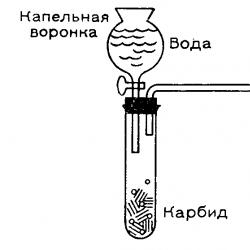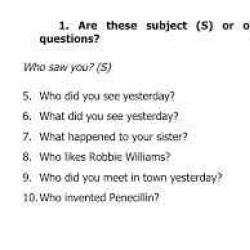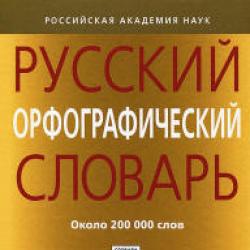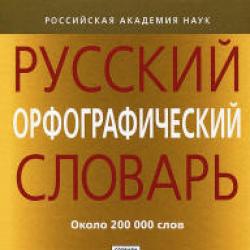Questions to the subject in English: diagrams and examples for all tenses. Negative form of questions to the subject in English
In order to ask a question to the subject in English, you first need to understand 3 things: what the subject is (the main member of the sentence, answers the question who? what?), what and.
Special question to the subject in English. Structure.
1. My colleague is writing a report in the office.
2. 10 students came to school.
3. Porridge is burning in the kitchen.
Negative form of questions to the subject in English
The negative form of questions to the subject in English is built on the principle of negative sentences, that is, the auxiliary verbs do, does, did are used. The particle NOT is placed after a modal or auxiliary verb.
4. This student hasn’t answered my question yet.
5. Kate doesn’t speak English.
How to formulate a question to a subject in English?
- Find the subject in the sentence.
- Replace it with a suitable interrogative pronoun
- Who? (who?) or What? (What?). - Keep the direct word order, while leaving all the members of the sentence in their places.
- Writing a question to a subject in English
remember to agree the verb with the subject - in the Present Simple we use the verb in
third person singular - add the ending -s (es) to
verb (e.g. Who wants tea?). IMPORTANT! Question to determination of the subject
has the same structure as a question to the subject,
they use special words such as what?
(which?), which (which?), whose (whose?), how many/much
(How many?).
Questions to determine the subject in English:
- What film is the best? What is the best movie?
- How many students attend lectures? How many students
attending lectures?
Examples of questions to the subject in English
Example 1
John is going to England next week.
1. Subject - John
2. Replace John with who
3.We maintain direct word order (that is,
subject + predicate)
Question to the subject: Who is going to England
next week? Who's going to England next
week?
Example 2
Viktuk's play was staged.
Questions to the subject:
Whose play was staged?
Whose play was staged?
What was staged? What did they put on stage?
Example 3
The girls are happy.
Question to the subject: Who is happy? Who
happy?
Example 4
We were in the circus.
Question to the subject: Who was in the circus?
Who was at the circus?
Example 5
We were in the circus.
Question to the subject: Who was in the circus?
Who was at the circus?
Exercises (question to the subject in English
language)

- 5 (O)
- 6 (O)
- 7 (S)
- 8 (S)
- 9 (O)
- 10 (S)
Exercise 2. Compare pairs of sentences, find the subject in each sentence, determine which of the questions is a question to the subject - a) or b), translate the sentences into English. In one of the pairs, both sentences are questions to the subject.
- a) Who will you go with? versus b) Who will go
with you? - a) What does he do? versus b) Who does it?
- a) Who thought about his health? versus b) What did he think about?
- a) Whose car did you scratch? versus b) Who
scratched your car? - a) Which girl has served dinner? versus
b) Who has to serve dinner?
- a) Who will you go with? Who are you going with? versus b)
Who will go with you? Who will go with you? b) - question to
subject - What does he do? What is he doing? versus Who does it?
Who does this? b) - question to the subject - Who thought about his health? Who thought about his
health? versus What did he think about? What is he talking about
thought? a) - question to the subject - a) Whose car did you scratch? Whose car are you
scratched? versus b)Who scratched your car? Who
scratched your car? b) - question to
subject - Which girl has served dinner? Which of the girls
have you served dinner? versus Who has to serve dinner? Who should
Serve dinner? a) and b) - questions for
subject
Exercise 3. Correct the mistakes.
- Who likes to sing?
- Who was in the park?
- What does make you think so?
- Who did see the accident?
- What does need washing?
- Who did make you feel disappointed?
Sometimes you need to find out who is doing or has done an action. For example, someone gave your friend a gift. To clarify who exactly gave the gift, you will ask the question: “Who gave you the gift?”
Every day we ask questions like this: “Who called you? Who is messaging you? Who will go to the store?
In English, this type of question is called questions to the subject. Such questions are very easy to construct.
Below I have written detailed instructions on how to ask these questions.
So in such sentences the characters are apple and books. And, despite the fact that they are not at the beginning of the sentence, we must remove them. At the same time, there becomes in their place, and we put what / who in the first place. The scheme of such a proposal will be as follows.
Examples
So, we've figured out how to ask a question to the subject, and now let's find out how to answer it.
How to answer a subject question in English
The answer to this question could be:
- short,
- full.
Short answer to the question to the subject
If we give a short answer, we must name the one who performs the action, has the attribute and add to it an auxiliary verb/modal verb/verb to be (depending on what is used in the sentence).
The short answer will look like this.
Actor + auxiliary verb/modal verb/verb to be.
For example, we have a question
Who work ed yesterday?
Who worked yesterday?
This question is asked in the Past Simple, the auxiliary verb in this tense is did. Therefore, the answer will include the actor and did.
Sam did.
Sam.
Let's look at a few more examples.
Who likes es to get up early? Mary does.
Who likes to get up early? Mary.
Who can open the door? They can.
Who was at home? Children were.
Who was home? There were children.
Who is angry? Mother is.
Who's angry? Mom is angry.
In the colloquial version, we can simply name the character.
Who watch this serial? Mary.
Who watched this series? Mary.
Complete answer to the question to the subject
To give a complete answer, you need to put the actor in the place of who/what.
Who will go to the cinema? my friends will go to the cinema.
Who will go to the cinema? My friends will go to the cinema.
Remember to change the sentence if you are talking about several people when answering.
Who has a dog? my friends have a dog.
Who has a dog? My friends have a dog.
Who was hungry? They were hungry.
Who was hungry? They were hungry.
We've covered the theory, now let's put it into practice.
Reinforcement task
Translate the following sentences into English:
1. Who plays in the park?
2. Who works here?
3. What broke?
4. Who are the engineers?
5. Who can help me?
6. Who will watch this film?
7. What's on the shelf?
8. Who speaks English?
Leave your answers in the comments below the article.
Verbitskaya M.V. Forward. English for 3rd grade. Unit 4 How do you spell it? + Workbook
How do you spell it? - How do you spell it?
1. Tell me in Russian what you know about Australia. What are Jill and Ben holding?
Listen and look. - Listen and look.
Tell me about Australia - Tell me about Australia
Well, we come from Wollongong. - Well, we're from Wollongong.
Woo..Woll..Where? – Vul...Vol...Where from?
Wollongong. - Wollongong.
How do you spell it? - How do you spell it?
W-o-l-l-o-n-g-o-n-g. - V-u-l-l-o-n-g-o-n-g.
Look, here it is on the map. - Look, here it is on the map.
Oh yes, I see Wollongong. “Oh yes, I see Wollongong.
2. Read the text. - Read the text.
Talk to your friend about picture 1 – Talk to your friend about picture 1:
What's this? - What is this?
Who's this? - Who is this?
What’s he (she) wearing? – What is she (him) wearing?
What color is his T-shirt? – What color is his T-shirt?
3. A map of Australia. Where does Cody come from? Listen and find the places. — Map of Australia. Where is Cody from? Listen and find places.
4. Read the transcription of new words. Can you guess what they mean in Russian?
surfing - surfing, opera - opera, continent - continent, station - station, koala - koala, dingo - dingo
6. Listen and repeat. - Listen and repeat.
Write the words in two columns and read. Are there words that should be written in both columns?
Body - body, box - box, fox - fox, popcorn - popcorn, rocket - rocket, hall - hall, hobby - hobby, hockey - hockey, model - model,
Ball - ball, four - four, horse - horse, forward - forward, orange - orange, popcorn - popcorn, port - port, sausage - sausage
9. Answer the questions. - Answer the questions.
Where are you from? – I’m from Russia. - Where are you from? - I'm from Russia.
How do you spell it? – R-U-S-S-I-A – How do you spell it? - Russia.
10. Read the statements. Tell me if it's true or not. Say true or false. Find confirmation of your choice in the texts you have read before.
1. Cody has got a sister. – No. — Cody has a sister.
2. Todd is Cody's brother. – Yes. — Todd is Cody's brother.
3. Cody's got a horse. – No. — Cody has a horse.
4. Todd is three years old. – Yes. — Todd is three years old.
5. Cody’s family is from the USA. – No. — Cody family from the USA.
11. Listen and repeat the questions in which the intonation is called descending.
Who lives in Moscow? — Who lives in Moscow?
Who is a teacher? - Who is the teacher?
Who is a pupil? - Who is the student?
What's big? - What's big?
What's old? - What's old?
What's beautiful? -What is beautiful?
12. What questions did Dasha answer from Cody? Read her answers and guess what the questions were.
Who's Nikita? (Who is he?) Nikita’s my brother. -Who is Nikita? (Who is he?) Nikita is my brother.
Who lives in Vladimir? Maxim lives in Vladimir. — Who lives in Vladimir? Maxim lives in Vladimir.
What is your favorite city? Moscow is my favorite city. — Your favorite city? Moscow is my favorite city.
13. Vera composed a riddle poem about the letters of the alphabet for Cody. Write down the whole poem. Can you think of a sequel?
A is an apple. - A - apple.
It is big and red. - It's big and red.
B is a bee - B - bee
It's on my knee. - She's on my knee.
With is a cat. - S - cat.
And this cat is fat. - This cat is fat.
14. Act out the dialogues according to the model, supplementing the questions to the subject with the words what or who.
What is red? The apple is red. -What's red? The apple is red.
Who is from Australia? - Who is from Australia?
What is yellow? -What's yellow?
Who lives in England? - Who lives in England?
15. Make up a dialogue, matching the answers to the questions. Which questions can be answered in one word, and which ones require a detailed answer? Continue the dialogue yourself.
Who's Todd? Todd is Cody's brother. -Who is Todd? Todd is Cody's brother.
Who is from Australia? Cody's from Australia. - Who is from Australia? Cody from Australia.
Is he five years old? no. - She is five years old? No.
Does Nikita like dogs? Yes. – Does Nikita like dogs? Yes.
16. Read the questions and answers silently and find a short answer to each question.
1) Has Cody got a brother? B) Yes, she has. — Does Cody have a brother? Yes.
2) Does Vera live in England? C) No, she doesn’t. — Does Vera live in England? No.
3) Are Jill and Ben from England? A) Yes, they are. — Jill and Ben from England? Yes.
17. Complete general questions about Kodi using the verbs from the box. Remember the texts you read and answer the questions briefly.
1) Is Cody eleven years old? — Cody is eleven years old?
2) Are Cody and Jill Ben's friends? — Are Cody and Jill Ben's friends?
3) Has Cody got a horse? — Does Cody have a horse?
4) Is Cody a very good swimmer? — Is Cody a very good swimmer?
5) Does her grandmother live near the beach in Australia? — Does her grandmother live near the beach in Australia?
6) Do they swim in the sea in Australia? — Do they swim in the sea in Australia?
18. Spelling game. Guess the word from the pictures. Which of your classmates can quickly guess the word from its first letters?
There are 5 letters in my word. Dingo! – My word has 5 letters. Dingo!
kangaroo - kangaroo, bike - bicycle, bear - bear, wardrobe - closet, radio - radio, lamp - lamp, crocodile - crocodile
19. Guess the words. Tell me by letter how they are written.
neleev – eleven – 11
tenywt – twenty – 20
ofurente – fourteen – 14
tsxeeni – sixteen – 16
vetelw – twelve – 12
enthirte – thirteen – 13
Workbook Unit 4
A. Connect the letters in alphabetical order.
A B C D E F G H I J K L M N O P Q R S T U V W X Y Z
What is it? It's an - What is this? This…
B. Decipher the message and write it down.
My name is Peter. I come from India. Meet me at the swimming pool. - My name is Peter. I am from India. Meet me at the pool.
C. Write the story. - Write a story.
1. Hello. My name's Harry. What's your name? Spike. - Hello. My name is Harry. What is your name? Spike.
2. How do you spell it? – S-P-I-K-E. - How do you spell it? S-p-a-y-k.
3. Is that your friend? – Yes, she is. - Is it your friend? Yes.
4. What's her name. Bluebird. - What is her name? Bluebird.
D. Listen. Fill in the forms. (Fill out the forms.)
Name: Matthew
Lives in: Manchester
Name: Caroline
Lives in: Brighton
E. Make a code wheel.
Draw two circles. - Draw two circles.
Write the alphabet. - Write the alphabet.
Cut out the circles. - Cut out the circles.
Put the two circles together. - Place two circles together.
Turn the wheel. - Turn the wheel.
Write a message. — Write a message.
related posts:
- Verbitskaya M.V. Forward. English for 8…
- Verbitskaya M.V. Forward. English for 11…
(Speakers: two passengers)
I don't need to. It's only for non-British citizens.
Oh. yes, of course. Is this the way?
Have you filled in the immigration card?
No, I go through here - "British Passport", you see. I"m afraid you have to go over there. It says "Commonwealth and EEC Passports".
All right. See you outside the baggage claim area.
(Speakers: custom officer and passenger)
Can I see your passport?
Certainly, here it is.
Have you anything to declare?
What's the purpose of your visit?
I"m attending a conference in London.
Well, would you mind opening this bag, please.
thank you. right. That's all. You can go through now.
Dialogue 4 Role-play the dialogue.
A. Hello, Peter. Here you are safe and sound. Did you enjoy your trip by air?
Q. Oh, it was an exciting trip. I think there"s nothing like flying. It"s so convenient and besides it"s the quickest way of travel. It took me only five hours to get here.
A. And how long would it have taken by train?
B. Three days, I think. I shall never go by train now if I can fly.
A. And what about a ticket? Was it easy to get?
B. Oh, quite easy. I booked my ticket in advance at an air-travel booking office. It took me only a few minutes to do that. The very next day I had it delivered to the hotel I was staying at.
A. And how did you like the plane? It's wonderful inside, isn't it?
B. Oh yes. It's very comfortable. The hostess, a very nice-looking girl, took great care of the passengers and offered us some snacks and soft drinks.
A. I see that you traveled in comfort. At what height did you fly?
B. At a height of eight thousand to nine thousand meters. I say, why don't you try to fly by plane?
I will try it by all means.
Dialogue 5 Role-play the dialogue. Ticket reservation fin the usa
Travel Agent: Can I help you?
Mr Campbell: I want to fly to London next week. I "d like to make reservations for a round trip ticket. A: What day are you planning to leave for London?
C: On the 12th of March.
A: There are three flights to London on that day - at 10 a.m., at 8.30 and 9 p.m.
C: I"d rather leave at 9 p.m. I want to get to London early in the morning.
A.: I can make a reservation for TWA flight. Are you going to travel first class or economy?
S: I prefer economy. How much will it be?
C: Are meals and refreshments served on the flight?
A: Yes, they are.
C: What's the flying time?
C: What's the London airport we'll arrive at?
A: Heathrow Airport. How many days are you going to stay in London?
A: When would you like to fly home from London? C: March 22nd.
A: All right. Your name and address?
C: Mr Campbell; 64-42 99th Street. Rego Park. New York 11374.
A.: Will you pay by credit card?
C: Yes, by Master Card. When can I get my tickets?
A: You"ll have them two days before your departure.
Dialogue 6
In the plane
Stewardess: May I have your seat number? It is given in your boarding card. Mr Campbell: Here you are.
S.: This way, please. Your seat is over there - third row on the right, next to the porthole. You may put your hat and raincoat on the rack.
S. (to passengers): Ladies and gentlemen, please fasten your seat-belts and refrain from smoking.
The stewardess passes down the plane with a tray offering sweets to the passengers.
S. (To Campbell): Here you are, sir. It"s good to have something to chew when the plane takes off. C: Thank you. At what altitude are we going to fly? S.: The altitude will be about twenty five thousand feet. C: And what have you got to read here?
S.: Oh, a good number of newspapers and magazines. They are over there, in the very front of the compartment.
S.: Ladies and gentlemen. In 10 minutes we shall be landing at Heathrow. Please remain seated with safety belts fastened and with the seats in an upright position until the plane has come to a complete halt. Please refrain from smoking. thank you.
Find in the dialogues the English equivalents of these sentences:
I want to fly to London next week.
How long do you plan to stay in London?
In 10 minutes we will land.
When do you plan to fly out of London?
Fasten your seat belts and refrain from smoking.
Are there flights to London on Saturday morning?
What class are you going to travel in?
May I know your seat number?
There are 3 flights to London on this day.
10. I can book a seat on a TWA flight.
In this lesson we will learn how to correctly pose questions to the subject and object.
Thus, if we briefly define the principle of creating a question to a subject in English, we get the following: we take an affirmative sentence, remove the subject, and in its place we put the corresponding question word - who/what. You just need to remember that in the present tense the verb in the sentence will have the third person singular form.
Mary and Ann like walking in the park. -MaryAndAnnlovewalkVpark.
Who like s walking in the park?
They know his real name. -Theyknowhisthe presentName.
Who know s his real name? -Whoknowshisthe presentName?
You have big problems with the grammar. -UyoulargeProblemsWithgrammar.
Who ha s bigproblemswiththegrammar? - Who has big problems with grammar?(Fig. 2)

Rice. 2. Illustration for example ()
Please note that, despite the subject in the affirmative sentence, in the question after what and who the verb will still have the 3rd person singular form. hours at any time.
Answers to questions to the subject
We now know how to ask a question to the subject. How to answer this question?
A question to the subject is usually given a short answer, consisting of the subject (expressed by a noun or pronoun in the nominal case) and an auxiliary verb of the appropriate tense.
E.g. Who know s the answer to the question? - She does.
Who knows the answer to this question? - She(knows).
Since the question was asked inpresentSimple, then in the answer we must take an auxiliary verbdoordoes. ForsheThiswilldoes.
Who play s in the garden? - My children do.
Who playing in the garden? - My children ( play).
Question asked inpresentSimple, which means in the answer formychildren (they) we must take an auxiliary verbdo.
Who will go to the chemist's? - I will.
Who going to the pharmacy? - I(I'll go). (Fig. 6)
Since the question was asked inFutureSimple, then in the answer we take the auxiliary verbwill.

Rice. 3. Illustration for example ()
Who made three mistakes in the test? - He did.
Who made three mistakes in the test? - He ( did).
Question asked inPastSimple, so in the answer we must take the auxiliary verbdid.
Verb tobe in short answers does not require an auxiliary verb. He himself performs this function.
E.g.Who is in the classroom? - I am.
Who Vclassroom? - I.
Who is ready to answer? - Tom is.
Who ready to answer? - Volume.(Fig. 7)
Who is there? - We are.
Who there? - We.

Rice. 4. Illustration for example ()
Questions for the supplement
We have examined the question for the subject, and now let’s see how questions for the object are formed.
Additions in English, as in Russian, can be used with or without a preposition. Most often, a prepositional object is called direct, and a prepositional object is called indirect.
There are no special problems with questions for the supplement. If there is no preposition in the affirmative sentence before the object, then the question pattern is as follows:
In the first place we put the question word who (for animate)/what (for inanimate), then we put the auxiliary verb, then the subject, the semantic verb and all other members of the sentence. The very addition to which we are asking the question is not in the question.
E.g. What are you reading?
What Youreading?
What do do you want to show us?
What do you want to show us?
Who did will you meet there?
Whom did you meet there?
What do you think?
What Youthink?
What did the teacher read to the students?
What did the teacher read to the students?(Fig. 8)

Rice. 5. Illustration for example ()
If the matter concerns an indirect addition, that is, one with a preposition, then we construct a question, as in the previous case, but only we place the preposition at the end of the question after the predicate or other addition.
E.g. Who are you speaking of?
ABOUT com Youspeak?
What are you looking at?
On What Yousee?
Who do you want to speak to?
With whom do you want to talk?
What do you complain of?
On What Youcomplaining?
Who did the teacher read a story to?
To whom did the teacher read the story?
In a short answer to questions about the addition, we simply name the subject itself, that is, the addition itself.
Branch 1. Ending - s V present Simple
In Present Simple time, the ending receives the 3rd person unit. h., that is, he/she/it.
E.g. He read s many books.
Heis readinga lot ofbooks.
She like s playing the guitar.
She likes to play the guitar.(Fig. 3)
It often rain s in my region.
It rains often in my region.

Rice. 6. Illustration for example ()
In general, we really just add the ending -s to the verb, but there are a few special points.
If, for example, an infinitive (i.e. a verb without the particle to) ends in -s, -ss, -sh, -ch, -x, -z, then we will add the ending -es to it.
E.g. he loses
She tosses
She pushes
He teaches
She mixes
Itbuzzes
And if the infinitive ends in -y, then we add the ending -es to it, but at the same time y changes to i.
E.g. to cry - the baby cries
To fly - the plane flies
To study - the boy studies
Well-known verbs such as go and do, which end in -o, add singulars in the 3rd person. h. ending -es.
E.g. to do - Does he work here?
To go - she goes to school
To construct a negative question to the subject, we must after who and what put an auxiliary verb with the particle not.
E.g. Who does not know the last rule?
Who doesn't know the last rule?
Who was not at the library yesterday?
Who wasn't in the library yesterday?
What will not cause the fire?
What won't cause a fire?(Fig. 4)

Rice. 7. Illustration for example ()
Lastorlatest?
Both the word last and the word latest are translated as “last”. But there is a difference between them.
If by the word “last” we mean something after which there is nothing and nothing will happen, then we must use the word last.
E.g. Last the letter of the English alphabet is Z.
The last letter of the English alphabet is Z.
It is clear that after the letterZThere can be no other one, since the alphabet ends with it.(Fig. 5)
This last composition by this singer. He won't sing anymore.
This is thelast song of the singer. He will not sing any more.
After this song there will be no others, as the singer refuses to continue his career.
Rice. 8. Illustration for example ()
If by the word “last” we mean something the freshest, the newest, the most modern, then we should use the word latest.
E.g. You already heard recent news?
Have you already heard thelatest news?
The news is always the freshest and newest, and is always followed by even more relevant ones.
Last The model of this car is much cheaper than the previous one.
Thelatest model of this car is much cheaper than the previous one.
We are talking about the newest and most modern model of the car, after which many more different models will certainly be released.
Basic geometric shapes
You know what the basic geometric shapes are called in Russian. Here are some short poems that will help you remember their English names better.
I"m Suzy Circle.
I'm happy as can be.
I go round and round.
Can you draw me?
I'm Susie Krug.
I am very happy.
I spin and spin.
Can you draw me?
I'm Tommy Triangle.
One, two, three!
I'm Tomi Triangle.
Look at me!
Count my sides.
One, two, three!
Sammy Square is my name.
My four sides are just the same.
Turn me around, I don't care.
I"m always the same.
I"m Sammy Square.
My name is Sammy Square.
I have four identical sides.
If you want, turn me over, I don't care -
I won't change.
I'm Sammy Square.
Ricky Rectangle is my name.
My four sides are not the same.
2 are short and 2 are long.
Count my sides, come right along.
One, two, three, four.
My name is Ricky Rectangle.
My four sides are not the same.
Two short and two long.
Come on, count my sides.
One, two, three, four.
Self-test tasks
Now let’s do some exercises to understand the formation of subject and object questions better.
Now let's do some exercises to better understand the formation of subject and object questions.
Look at the sentences and fill the gaps with the right word - who or what.
1. ___ works with you? → Who
2. ___ is playing the violin? → Who
3. ___ are you talking about? → What
4. ___ did you buy that for? → Who
5. ___ did you take his advice? → What
6. ___ wants to go there? → Who
7. ___ is going on? → What
8. ___ will happen if I leave the room? → What
9. ___ has called you? → Who
10. ___ your friends think about her? → What
Bibliography
- Afanasyeva O. V. Series “New English course for Russian schools.” Grade 5 - M: Bustard, 2008.
- Fomina I. N., Fomina L. V. English in algorithms. - Dnepropetrovsk, 2007.
- Pakhotin A. Everything about modal verbs and the subjunctive mood in English. - M: Karev Publisher, 2005.
- Dubrovin M.I. Illustrated guide to English grammar. - M: “Nachala-Press”, 1992.
- Educational Internet resources - English language ().
- Interactive-english.ru ().
- Enative.narod.ru ().
Homework
Insert who or what in place of the blank.
1. ___ is this boy right next to you? 2. ___ were you doing at home last Tuesday? 3. ___ does he like singing? 4. ___ has a lot of interesting books? 5. ___ are you talking about? 6. ___ plays football every Sunday? 7. ___ interesting have you seen there? 8. ___ makes you feel better? 9. ___ are you looking at? 10. ___ gets up every workday and goes to school?
Ask a question to the subject.
For example: They work at the office. - Who works at the office?
1. She cooks well. 2. They often go to the cinema. 3. Happiness is all that I need. 4. The flowers are very nice. 5. He takes a lot of my time. 6. I skate badly. 7. The sun is shining brightly. 8. She always gives me her books. 9. I usually work in my room. 10. Moscow is the capital of Russia.






